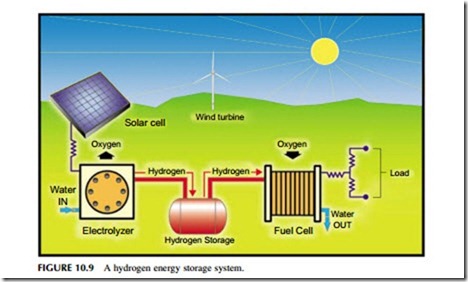HYDROGEN ENERGY STORAGE
Hydrogen offers a potential energy storage medium because of its versatility. The gas can be produced by electrolysis of water, making it easy to integrate with electricity generation. Once made, the hydrogen can be burned in thermal power plants to generate electricity again or it can be used as the energy source for fuel cells. In both cases the only combustion product is water. Potentially, it may also be used as an automotive replacement for petroleum or natural gas. Finally, hydrogen has a high-energy density making it an efficient means of storing energy.
For all these reasons hydrogen has been seen as a potential fossil fuel replacement in a future energy economy. For this to become feasible, several problems must be overcome including improving efficiency of its production and finding an economical means of storing it for automotive applications. In the meantime, the limited use of hydrogen as an energy storage medium for intermittent renewable sources such as wind energy is being explored.
Hydrogen Energy Essentials
Hydrogen, as a fuel, can be generated by the electrolysis of water using an electrical voltage. This has been carried out industrially for many years with the main system being an alkaline electrolyzer, exploited most successfully by the Norwegian utility Norsk Hydro. Large-scale electrolyzers have been built that are capable of handling inputs of 100 MW for hydrogen generation and the product is around 99.8% pure. Conversion efficiency is 90%. Alternatives to the alkaline electrolyzer are proton exchange membrane electrolyzers that are currently being developed and could potentially achieve 94% efficiency, but with the need for a platinum catalyst. High-temperature ceramic electrolyzers are also under development.
Once produced, hydrogen must be stored, for instance, as shown in Figure 10.9. While the gas has a high-mass energy density, it is very light and has a low-volume energy density so it must be compressed or stored in a concentrated state. For power generation applications, storage under pressure in steel or composite tanks is probably the favored method. The gas can be liquefied but only by using cryogenic equipment, making the process costly. There have also been attempts to store hydrogen in the solid state within certain alloys that will absorb it in large quantities. This may eventually offer the best storage method for automotive applications, although the weight of the storage system is currently a major problem.
Once manufactured and stored, hydrogen can be converted back into electricity in a number of ways. It can be burned like natural gas, although the combustion temperature is generally higher than for the former. However, most gas turbines, piston engines, and gas-fired boilers can easily be adapted for its use. When burned in this way it produces only water as a by-product. Alternatively, and possibly most efficiently, hydrogen can provide the fuel for a fuel cell sys- tem as illustrated in Figure 10.9. For a future energy economy based on hydro- gen, this offers one of the most promising solutions with 60% efficiency achievable in a simple fuel cell and perhaps 70–75% with a hybrid system.
Performance Characteristics
When used as an energy storage medium within an electricity system, hydrogen will generally be used as fuel in a conventional or fuel cell power plant and generally cannot be brought into service as rapidly as some of the fast-acting storage systems discussed above. It should, therefore, be considered as a system of energy arbitrage rather than for grid support.
The main drawback today of hydrogen storage is the round cycle efficiency. With an electrolyzer operating at 90% efficiency and a power plant converting it back into electricity with perhaps 60% efficiency, the best roundtrip efficiency that can be expected is 54%, much lower than other storage systems discussed earlier. Such low efficiency may be tolerable in a renewable energy storage sys- tem, such as a wind–hydrogen storage unit where the wind energy must other- wise be shed. It is unlikely to be considered sufficiently efficient for generation from off-peak grid power in most other circumstances if there is an alternative available.
Costs
Since hydrogen energy storage as an electrical energy storage medium has yet to be tested, there are no realistic costs available for practical systems. If it is to be of use it would need to be able to compete with the high storage capacity technologies such as pumped storage hydropower, CAES, or large battery storage.
